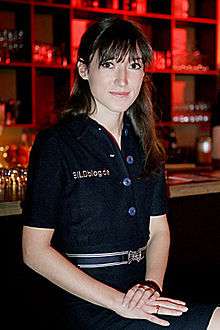Charlotte Roche
| Charlotte Roche | |
|---|---|
 Charlotte Roche during a reading in Berlin, 2007 | |
| Born |
18 March 1978 High Wycombe, England |
| Nationality | British |
| Spouse(s) |
Eric Pfeil Martin Keß (2007–present) |
| Children | daughter Polly (2002) with Eric Pfeil |
Charlotte Elisabeth Grace Roche (born 18 March 1978 in High Wycombe, England) is a British[1] television presenter, producer, actress and author living in Germany.[2] She is best known for her novel Wetlands.
Life and career
Roche, the daughter of an engineer and a politically and artistically active mother was born in High Wycombe UK near London and raised in Germany.[3] In 1983, when Roche was five years old, Roche's parents divorced, an event and experience that Roche later incorporated in her novels Feuchtgebiete (English: Wetlands) and Schoßgebete (English: Wrecked). She grew up in the Lower Rhine region, in a family with liberal views. Her primary school was in Niederkrüchten. In 1989 she went to the secondary school, St. Wolfhelm Gymnasium, in the neighbouring town of Schwalmtal. When she was 14 years old she moved to Mönchengladbach, where she was educated at the Hugo Junkers Gymnasium in Rheydt. She left school after the 11th grade, at the age of 17. She obtained initial stage experience in drama groups during her time at school.[4]
Roche left home in 1993, still aged 17, and formed the garage rock group The Dubinskis with three female friends. The band never released an album, nor recorded any material, nor notably performed anywhere. There followed a period where she undertook anything that would shock and offend people – self-mutilation to paint with blood, drug experiments, or shaving her head. After successfully auditioning for the German music channel Viva, she worked there for several years as a video jockey and presenter, as well on the sister channel Viva Zwei, where she presented her show Fast Forward.
Roche has a daughter, Polly, born in 2002, whose father Eric Pfeil was the producer and writer of Roche's programme Fast Forward and Der Kindergeburtstag ist vorbei! (The child's birthday party is over). Since 2007, Roche has been married to Martin Keß, co-founder of Brainpool, a media company in Cologne.
In 2006, Roche played the female lead in the German film Eden, directed by Michael Hofman. The film was widely distributed in Europe.
In an interview published in Der Spiegel in 2010, Charlotte Roche proposed to have sex with German president Christian Wulff in exchange for his veto on a new regulation extending the life of nuclear reactors,[5] highlighting the controversial extension, and Wulff's role in passing it into law.[6][7]
Writer
Roche's book Feuchtgebiete (English: Wetlands) was the world's best-selling novel at Amazon.com in March 2008.[8] Partly autobiographical, it explores cleanliness, sex and femininity, and had sold over 1,500,000 copies in Germany by early 2009.[9] For supporters it is an erotic literary novel; for critics it is cleverly marketed shock fiction bordering on pornography with a previously exhibited habit of the author of offense for the sake of offense.[2]
Justin E. H. Smith wrote of the novel in a review in n+1: "If Roche has hit on something true and heretofore unsaid, it is the insight that to write about bodily fluids is not to describe something exceptional in the course of human life. It is, rather, to describe something that is always there and always felt to be there, through all those other things people do and experience at that level that used to be the subject of novels (falling in love, challenging others to duels, talking about the buying and selling of land, etc)."[10]
Her second novel, Schoßgebete (English: Wrecked) was published in 2011. The novel makes reference to a family tragedy in Roche's own life: in 2001, her three brothers were killed in a traffic accident on the way to her wedding.[11]
Singer
In 2006 Roche featured on the single "1. 2. 3. ..." with German musician Bela B., from Bela's debut album Bingo.
Feminism
Roche is a representative of Germany's new feminist generation. In May 2001, she appeared on the cover of Emma magazine, the most renowned feminist publication in Germany. She represents sex-positive feminism and finds some standpoints of the classic 1970s German feminism, such as its full rejection of pornography, outdated and "wrong".[12]
See also
References
- ↑ "Charlotte Roche: 'Ich bin sehr englisch'", by Christoph Driesse, (dpa)/news.de, 9 October 2011 (in German)
- 1 2 "Publishers battle to sign up Europe's sex sensation", Jason Burke, The Observer, 25 May 2008
- ↑ https://www.nytimes.com/2009/04/19/books/review/Tisdale-t.html
- ↑ http://www.goodreads.com/author/show/880630.Charlotte_Roche
- ↑ details see de:Laufzeitverlängerung deutscher Kernkraftwerke
- ↑ "Roche offeriert Wulff Sex für Atom-Veto", Der Spiegel (14 November 2010) (in German)
- ↑ "Activist offers sex to German president for 'nuclear veto', The Indian Express (15 November 2010)
- ↑ "Fiction in German makes it to pole position", The Economist, 3 April 2008
- ↑ Caesar, Ed. "Charlotte Roche is an unlikely shock artist", The Times, 1 February 2009. Retrieved 21 March 2009.
- ↑ "Sea Slugs" by Justin E. H. Smith, n+1 (16 March 2009)
- ↑ Pidd, Helen "Charlotte Roche revisits mix of sex and controversy in new novel, Schossgebete", The Guardian, 16 August 2011, accessed 19 August 2011.
- ↑ Paterson, Tony (2011-08-27). "Charlotte Roche: Troubled mind of a taboo-buster". The Independent. Retrieved 2017-03-21.
External links
| Wikimedia Commons has media related to Charlotte Roche. |
- Oltermann, Philip (10 May 2008). "Interview: Charlotte Roche". Granta. Retrieved 10 April 2009.
- Charlotte Roche on IMDb